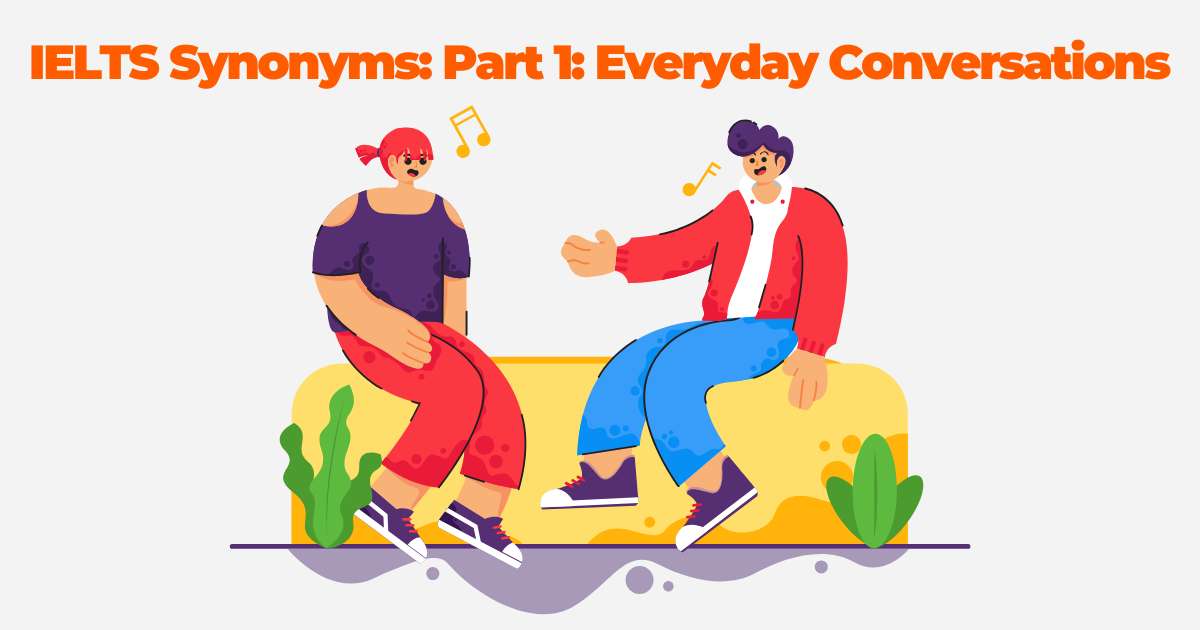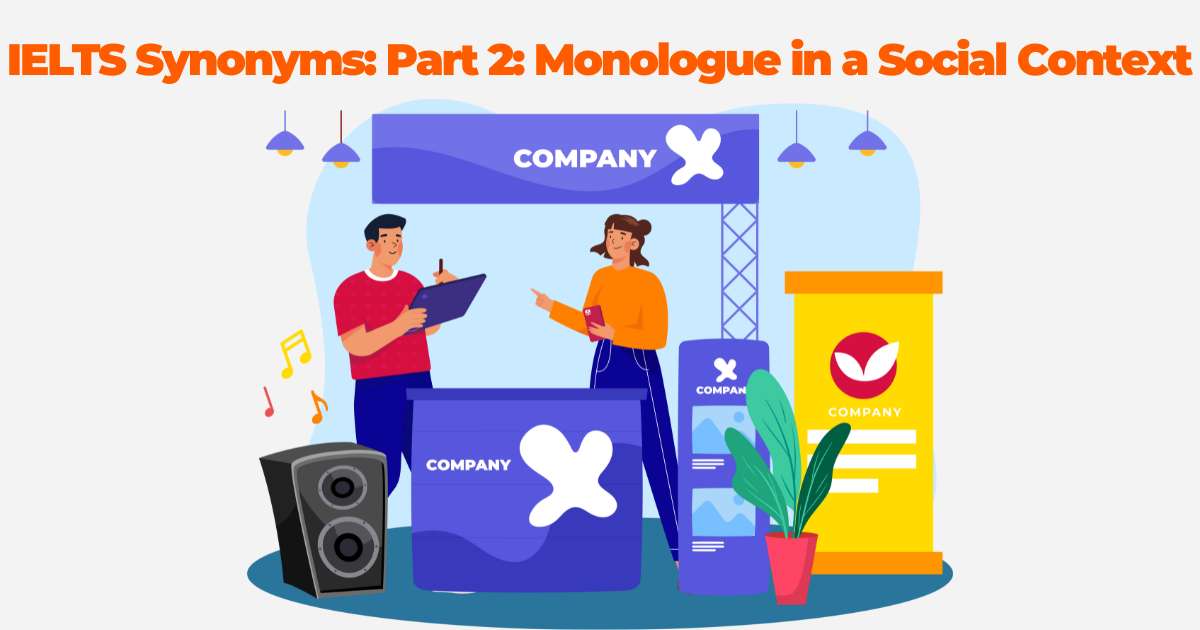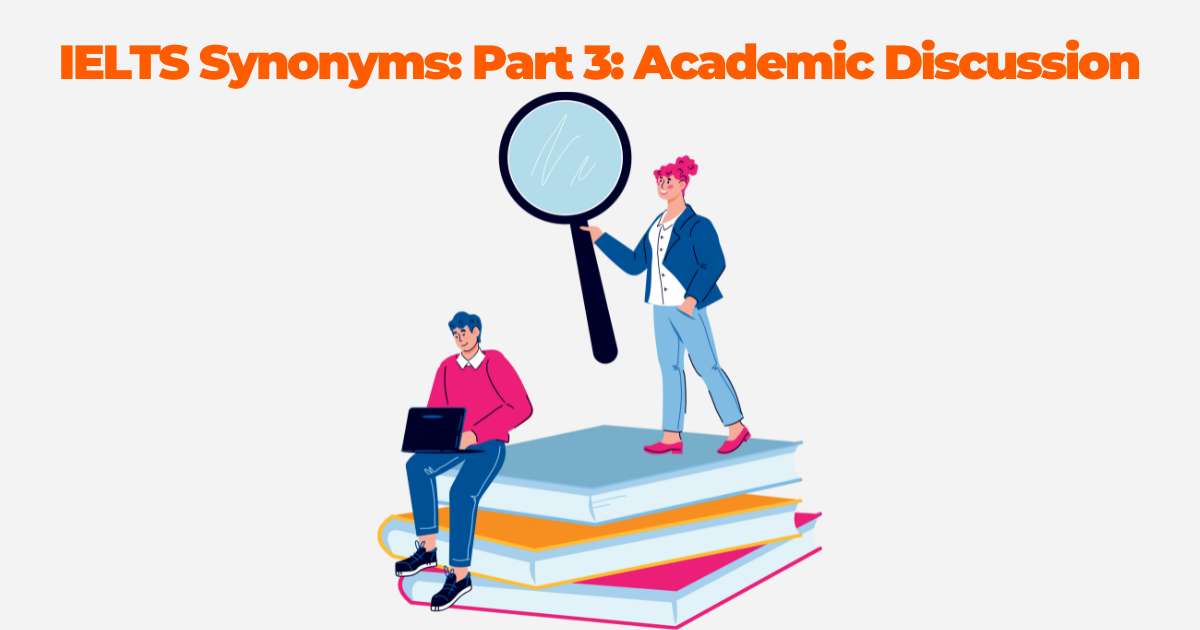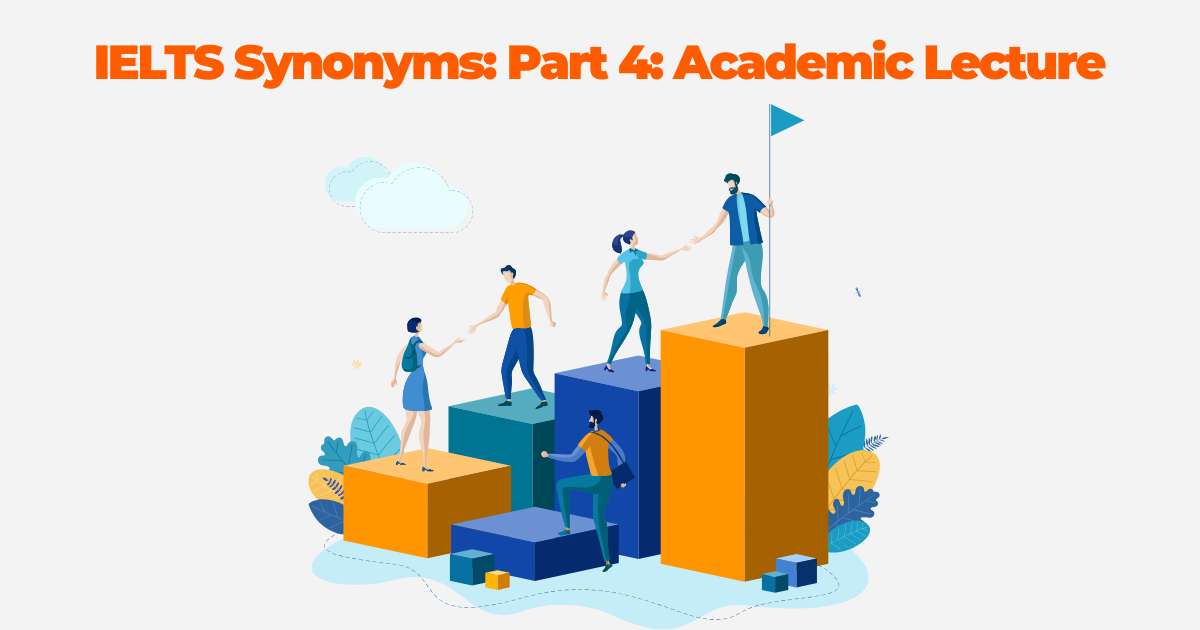40+ IELTS Synonyms to Improve Your IELTS Listening Score
IELTS synonyms play a crucial role in the Listening test, helping you recognize common word variations and avoid losing marks due to tricky vocabulary traps. This article provides a list of 40+ frequently used IELTS synonyms across different parts of the Listening test, along with real-life examples and practical tips to improve your listening skills and boost your score.
I. Why Are Synonyms Important in IELTS Listening?
In the IELTS Listening practice, it’s common to hear one word in the audio and see a different word in the question. These are called synonyms, which are words with the same or similar meanings. Understanding and recognizing synonyms is crucial to performing well in the listening section. For example:
- Audio: “The price is reduced.”
- Question: “The price is discounted.”
If you are unfamiliar with these two words being synonyms, you might miss the connection between the audio and the question, potentially losing marks. That’s why expanding your IELTS synonym vocabulary is essential for boosting your listening score. By preparing yourself with a range of synonyms, you’ll be able to recognize the connection more quickly during the test and answer questions with ease.
II. Top 40 Common IELTS Synonyms in Listening
Here’s a curated list of top IELTS synonyms frequently used in the Listening section. These IELTS synonyms are grouped by part and use-case to help you prepare more efficiently:
1. Part 1: Everyday Conversations
Part 1 often features a casual conversation between two people – like booking a hotel, joining a gym, or asking for services. Here are 10 commonly used IELTS synonyms:

| Word in Question | Possible Synonym in Audio | Example Sentence (Question) | Example Sentence (Audio) |
| Accommodation | Housing, Lodging | “Do you have any available accommodation?” | “We have some housing options available.” |
| Booking | Reservation, Appointment | “I would like to make a booking for tomorrow.” | “I have a reservation for two.” |
| Cost | Price, Fee | “What’s the cost of the ticket?” | “The price for the ticket is $50.” |
| Gym | Fitness Center, Health Club | “Is there a gym in the area?” | “The fitness center is open from 6 AM to 9 PM.” |
| Address | Location, Venue | “Could you give me the address?” | “The location is near the town hall.” |
| Service | Assistance, Help | “Can you provide service at the hotel?” | “I need some assistance with my reservation.” |
| Schedule | Timetable, Program | “What is the schedule for the seminar?” | “Here’s the timetable for the day’s events.” |
| Room | Chamber, Suite | “Do you have a room available?” | “We have a suite on the second floor.” |
| Job | Position, Employment | “I’m looking for a job in marketing.” | “The position is available for immediate start.” |
| Discount | Reduction, Offer | “Do you offer any discounts?” | “We have a special reduction for students.” |
Tips for Part 1:
- Focus on spelling, numbers, and simple everyday words.
- IELTS synonyms are often very simple but can be easy to miss under pressure. Stay calm and listen carefully.
2. Part 2: Monologue in a Social Context
Part 2 often involves a speaker giving information – like a tour guide, a manager at an event, or a university staff member. Below are some IELTS synonyms often heard in Part 2:

| Word in Question | Possible Synonym in Audio | Example Sentence (Question) | Example Sentence (Audio) |
| Event | Occasion, Function | “Can you tell me about the event schedule?” | “This occasion will be held at the main hall.” |
| Speaker | Presenter, Host | “Who is the speaker for today’s seminar?” | “The host will introduce the session.” |
| Information | Details, Data | “Could you provide more information about the program?” | “The details will be sent via email.” |
| Group | Team, Organization | “Which group is responsible for the presentation?” | “The team will share their findings shortly.” |
| Tour | Guided Visit, Excursion | “When does the tour start?” | “We will begin the excursion at 10 AM.” |
| Location | Site, Place | “What’s the location of the conference?” | “The site is near the city center.” |
| Directions | Instructions, Guidance | “Can you give me the directions to the hotel?” | “Follow these instructions to reach the venue.” |
| Guest | Visitor, Attendee | “How many guests are attending the meeting?” | “We have several visitors coming today.” |
| Activity | Event, Task | “What kind of activity will be organized?” | “The task for the afternoon will involve group work.” |
| Experience | Encounter, Event | “What experience should I expect from this workshop?” | “This event offers a great learning opportunity.” |
Tips for Part 2:
- Pay attention to location-based instructions or service details.
- Always consider the context of the situation to recognize synonyms more clearly.
3. Part 3: Academic Discussion
Part 3 involves 2-3 people discussing academic topics such as class assignments or research projects. Here are 10 useful IELTS synonyms for this section:

| Word in Question | Possible Synonym in Audio | Example Sentence (Question) | Example Sentence (Audio) |
| Research | Study, Investigation | “What’s the purpose of the research paper?” | “The study focuses on climate change effects.” |
| Project | Task, Assignment | “How long will the project take to complete?” | “This assignment is due next week.” |
| Problem | Issue, Challenge | “What problem does the project aim to solve?” | “One issue we’re facing is the lack of resources.” |
| Solution | Answer, Resolution | “What solution did you propose?” | “The answer to the problem lies in better communication.” |
| Conclusion | Outcome, Result | “What’s the conclusion of your study?” | “The outcome suggests a need for more research.” |
| Theory | Hypothesis, Concept | “Can you explain the theory behind your experiment?” | “The hypothesis is that increased activity improves outcomes.” |
| Study | Research, Examination | “How extensive is the study?” | “This research involved over 500 participants.” |
| Data | Information, Figures | “What does the data suggest?” | “The figures show a significant trend over time.” |
| Experiment | Trial, Test | “How many experiments were conducted?” | “The first trial showed promising results.” |
| Findings | Results, Discoveries | “What were the key findings of the research?” | “One of the major discoveries was the link between diet and health.” |
Tips for Part 3:
- Be ready for quick shifts in speakers and ideas.
- IELTS synonyms may be more academic or formal in tone, so focus on understanding the context of the conversation to identify them accurately.
4. Part 4: Academic Lecture
Part 4 is a monologue, often a university lecture on subjects like history, science, or business. Below are IELTS synonyms frequently found in Part 4:

| Word in Question | Possible Synonym in Audio | Example Sentence (Question) | Example Sentence (Audio) |
| History | Past, Chronicle | “Could you explain the history of the civilization?” | “The past of the empire is filled with remarkable events.” |
| Theory | Principle, Concept | “What theory are you discussing in this lecture?” | “The principle of quantum mechanics is quite complex.” |
| Evidence | Proof, Data | “What evidence supports your hypothesis?” | “The proof collected from various sources was overwhelming.” |
| Impact | Effect, Influence | “What was the impact of the discovery?” | “The effect of this research can be seen in modern technology.” |
| Method | Technique, Approach | “What method did you use to gather your data?” | “The technique we employed was highly effective in collecting data.” |
| Development | Advancement, Growth | “How did the development of this technology evolve?” | “The advancement in the field of robotics is astounding.” |
| Research | Study, Inquiry | “How comprehensive is the research conducted?” | “The study explored various theories of human behavior.” |
| Topic | Subject, Area | “What is the main topic of your lecture?” | “The subject of today’s lecture is the industrial revolution.” |
| Progress | Improvement, Development | “What kind of progress has been made in the field?” | “The improvement in renewable energy technologies is significant.” |
| Concept | Idea, Notion | “Can you explain the main concept behind your theory?” | “The idea of sustainability is crucial in modern economics.” |
Tips for Part 4:
- This part is the most academic, so expect more complex synonyms.
- Listen for signal words like “another point,” “in contrast,” or “to summarize” to help you identify the key ideas and related synonyms.
III. How to Practice IELTS Synonyms Effectively
Here’s a simple 3-step plan to level up your IELTS synonyms skills:
- Listen with Your Eyes: While watching IELTS listening videos, note down key words and listen for their spoken synonyms. This will help you see the connection between the question and the audio, even when different words are used.
- Build Synonym Pairs: Keep a notebook of words and their equivalents. List words and their synonyms by topic or test section. For example, have separate lists for words in Part 1, Part 2, and so on. Practice matching the synonyms together to enhance your recall.
- Use Practice Tools: Make the most of IELTS Test Pro to test yourself under exam conditions. Apps and flashcards are also great tools to regularly review synonyms. The more you practice, the more confident you’ll become in identifying synonyms during the actual test.
See more:
- Top 10 IELTS Listening Tips: Overcome Challenges and Achieve Your Target Score
- How to Avoid Distractors in IELTS Listening? Top 8 Common Types to Know
Mastering IELTS synonyms is an essential skill for achieving a higher IELTS Listening score. By expanding your synonym vocabulary, you’ll be able to recognize and understand the different ways information is presented in the listening test. Start by practicing the common synonyms listed in this article and continue building your knowledge with regular practice.